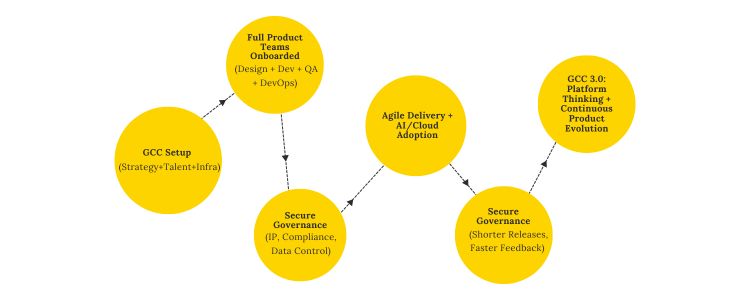
In today’s fast-paced digital economy, product companies face heavy pressure to rapidly innovate, protect their intellectual property, and maintain control over their technology roadmap. While outsourcing was once a well-known model to increase software development, now a change is clearly visible: Global Capability Center (GCC) is rapidly replacing traditional outsourcing, especially among product-centric enterprises. This change is not just a trend; it’s a future-driven strategy. The leading GCC companies in India are creating innovation DNA on which product companies are now dependent.
Outsourcing offered quick wins like cost savings, rapid recruitment, and measurement. But it also brought challenges like In the era of cloud-design platforms, AI-first development, and continuous distribution, companies need more than just increasing the number of employees; they need strategic expansion of their main product teams.
The Global capability centers are fully owned or dedicated centers installed in talent-rich markets like India. Unlike the outsourced sellers model, the GCC provides complete strategic alignment with the original company. Here is how they stand against traditional outsourcing:
India is dominating the GCC scenario globally. According to the Nascom 2024 report: Top companies such as Intuit, Atlassian, SAP, Walmart Global Tech, and Adobe have already established large-scale innovation GCCs in India.
As a leading GCC service provider, we are seeing that product companies are adopting the GCC due to many future-focused reasons, like: 1. Full Product Ownership Product companies seek ownership of the entire life cycle, from design to development and support, through GCC integrated product squads. 2. Built for Continuous Innovation GCC acts as a mini R&D centers with the AI labs, data science hubs, and design studio. 3. Fast Feedback Loop With DevOps and Agile Methods, GCC provides fast recurrence cycles, which are important for modern product development. 4. Strict compliance Especially in regulated sectors such as healthcare, fintech, and cybersecurity, companies give priority to GCC for data residency and policy alignment.
The installation of GCC is complex, from talent strategy and regulatory compliance to technical infrastructure. This is where experienced GCC consulting firms add a lot of value: Inductus GCC helps the product firms to navigate the entire GCC travel from the blueprint to the scale with the strategy designed for the future.
The next development, GCC 3.0, is focused on generation, platform manufacturing, and AI-First Engineering. India’s mature GCC ecosystem is already home to the following:
Outsourcing will always play a role, but for the product-first businesses, the future is owning the abilities rather than renting. GCC in India provides the correct mixture of cost, control, innovation, and compliance.
As a reliable GCC consulting firm, Inductus GCC helps product companies move beyond outsourcing and create strategic innovation centers that provide long-term competitive benefits. Thinking of expanding your GCC in India? Let’s co-produce the center ready for your future.
Product companies prefer GCC for more ownership, IP security, rapid innovation, and alignment with company culture, which often lacks outsourcing vendors. Initially, GCC may have a setup cost, but over time they provide better ROI due to high productivity, low attrition, and low seller dependence. GCC AI labs, design studios, and full-stack engineering teams act as innovation centers that speed up product ideas, prototypes, and releases. Outsourcing may lead to limited understanding of IP control loss, slow delivery, communication intervals, and product vision. GCC is developing as a strategic product engine with AI-Fund, cloud design, and platform-long capabilities, promoting long-term innovation. Aditi, with a strong background in forensic science and biotechnology, brings an innovative scientific perspective to her work. Her expertise spans research, analytics, and strategic advisory in consulting and GCC environments. She has published numerous research papers and articles. A versatile writer in both technical and creative domains, Aditi excels at translating complex subjects into compelling insights. Which she aligns seamlessly with consulting, advisory domain, and GCC operations. Her ability to bridge science, business, and storytelling positions her as a strategic thinker who can drive data-informed decision-making.
Why Outsourcing no Longer Works Alone
Why GCCs Are the Preferred Choice for Product Companies
Feature
GCC Model
Outsourcing
IP Ownership
Full control retained by parent company
Shared or vendor-managed
Talent Alignment
Culture + process aligned with HQ
Contractual, time-bound
Speed to Market
Agile teams, integrated workflows
Slower coordination, dependency on SLAs
Data & Security Compliance
Controlled and audited internally
Third-party risk exposure
Innovation Capability
End-to-end product thinking
Task-based delivery focus
Cost-Effectiveness
Long-term value with control
Short-term cost benefits
India: Hotbed for Global Capability Centers
GCC As An Innovation Engine
Why Product Companies Rely on GCC Consulting Firm
The GCC Future
The GCC Value Creation Journey for Product Companies

Conclusion
frequently asked questions (FAQs)

Aditi
Hey, like this? Why not share it with a buddy?
Related Posts
Recent Blog / Post
- The Green GCC Framework: Carbon Neutral by Design December 11, 2025
- Data Residency, Privacy, and Global Governance Challenges in GCCs December 11, 2025
- Applying Zero-Based Budgeting (ZBB) for Next-Gen GCC Cost Optimisation. December 10, 2025
- The Silent Crisis: Strategic Plays for Captive Centers to Avoid the ‘Year Three Plateau’ December 10, 2025
- Why Emotional Intelligence Is a Must-Have Competency in GCC Leaders December 10, 2025
- Bridging the Trust Gap: Unlocking European GCC Potential in India December 10, 2025
- The Telecom GCC Innovation Centre’s Role in Global 5G/6G Network Virtualisation. December 8, 2025
- Managing ITAR and Export Controls: The High-Security Mandate for Defence Captive Centers December 8, 2025
- Policy and the Multi-City GCC Grid: Catalyzing India’s Next Wave of Global Capability December 6, 2025
- BFSI GCC Digital Transformation: Moving from Back Office to Front-Line FinTech Innovation. December 6, 2025
- Pharma Global Capability Centers: Accelerating Drug Discovery with Computational Chemistry December 6, 2025
- ‘Capability’ and ‘Sustainability’ as the New Twin Drivers of GCC 3.0 December 4, 2025
- Beyond Cost: Using Value-Per-Employee (VPE) as the New Metric for GCC Cost Optimisation. December 3, 2025
- From Cost Arbitrage to Global Chip Architect: Securing India’s Tech Future December 2, 2025
- The Great Reskilling Challenge: Preparing the Workforce for GCC Digital Transformation by 2025 December 2, 2025
















